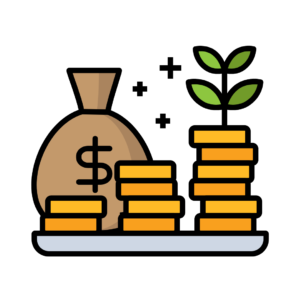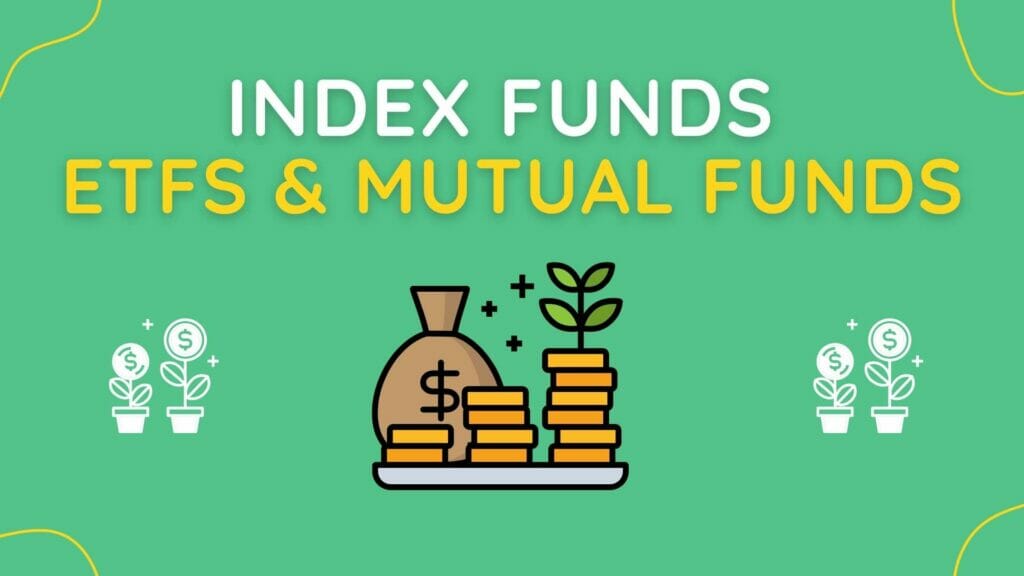
Sammie Ellard-King
I’m Sammie, a money expert and business owner passionate about helping you take control of your wallet. My mission with Up the Gains is to create a safe space to help improve your finances, cut your costs and make you feel good while doing it.

Quickfire Roundup:
Index funds, ETFs, and mutual funds are popular investment vehicles, each with unique characteristics.
An index fund is a type of mutual fund designed to mirror the performance of a specific index, such as the S&P 500, offering broad market exposure, low operating expenses, and low portfolio turnover.
ETFs, or Exchange-Traded Funds, are similar to index funds in their goal to track a specific index, but they trade like individual stocks on an exchange and offer more flexibility in terms of intraday trading.
Mutual funds, a category that includes index funds, pool money from multiple investors to invest in a diversified portfolio of stocks, bonds, or other assets, but they typically require a higher minimum investment and trade only once a day after the markets close.
At first glance, it seems like mutual funds, index funds, and ETFs are pretty much the same. While they have many similarities, there are some key differences as well. Let’s take a look at index funds vs ETFs and also have a look into mutual funds too.
Each has its own strengths and weaknesses and may have a place in your portfolio. Mutual funds are actively managed and will likely come with higher fees.
Exchange-traded funds are a group of individual stocks that trade on an exchange like a stock, while index funds are an investment tool designed to mimic the performance of an index, such as the S&P 500 for FTSE 100.
They may all sound similar, but the differences can be significant based on your investment goals and how active you manage your investments.
If you are investing in the stock market, you will likely, at some point, want to use at least one of these three tools. Let’s take a deeper dive so we can thoroughly understand each of these three.
Related Posts: Best ETF Platforms In The UK
Table of Contents
Index funds vs ETFs - What is the difference
Whilst they can have very similar holdings, ETFs are traded throughout the day like a standard stock, whilst Index funds can only be bought at the end of the trading day for a set price.
Index funds also usually have a more significant minimum investment requirement than ETFs.
Depending on what’s inside the ETF, there are some that are similar to Index Funds. They both are widely diversified, and you can end up holding the same stocks, although usually in different weighting.
What are mutual funds?
Mutual funds are a great way to diversify your portfolio away from owning just individual stocks. A mutual fund is a pool of money coming from many different investors that are then invested in a group of stocks or bonds.
The fund is actively managed, meaning there is a fund manager, who likely has a team of analysts working for them, who buys and sells the individual securities within the fund based on the past and expected performance.
The fund puts out a prospectus that identifies the goals of the fund and what they invest in.
The fund manager must stick to securities that fit the prospectus. Also, the fund typically must stay fully invested as well, meaning that no more than 5% of the fund’s assets may be in cash at any one time.
Staying fully invested can be a drawback in times of a recession, volatility or a market pullback.
Let’s say you are in a mutual fund that invests in small-cap European stocks, and you, the fund manager, and everyone else for that matter, who believes a recession is on the horizon, then the small-cap stocks are going to take a beating.
It would make sense for the fund manager just to sell many of the assets and sit on the cash until the market bottoms.
The fund manager, of course, cannot do this because it would violate the terms in the prospectus.
The fund manager’s job is to manage the fund according to the prospectus, not according to what they think will happen to the market as a whole.
Mutual funds offer tremendous diversification and the enormous value of having a team of professionals managing your money.
However, keep in mind that if you feel a recession is on the horizon, it is up to you, not the fund manager, to sell.
The good news is that mutual funds are so well diversified that if you have a long-term time horizon, staying invested in mutual funds through a downturn usually does not end up hurting you.
As we all know, the stock market has consistently increased over the long term.

What are ETFs?
ETFs are often much like mutual funds in that they are a basket of stocks all in one sector or industry that are traded in a group.
They offer a way to get broad exposure to a specific sector without researching any single stock. Research can be time-consuming and takes a certain amount of expertise.
Unlike mutual funds, they are not actively managed, so if one company in the fund reports a bad quarter with a poor outlook, a mutual fund manager will sell that stock, whereas an ETF would likely hold onto it.
If you have that stock in your ETF, it will drag down the entire fund’s performance.
Usually, the ETF will be diversified enough that one stock cannot substantially pull down the entire fund, and ETFs have lower fees than mutual funds.
As mentioned briefly earlier, a key difference when putting mutual or index funds vs ETFs are that mutual funds can only be traded once daily at the end.
When the market closes, the mutual fund settles based on the closing price of each security in the fund. Then the price per share is set for that day, and every trade placed that day is executed at that closing price.
ETFs can be traded intraday just like individual stocks, taking advantage of, or getting hurt by, price swings that occur in the middle of the trading day.
What are index funds?
Index funds are funds designed to mimic a benchmark index’s performance. They are another form of passive investing with minimal fees and an easy way to achieve instant diversification.
Index funds attempt to achieve market average returns, no more than that.
On the other hand, mutual funds try to beat the average market return. After all, mutual fund managers are judged by how well they compete with each other.
If brokerage A’s mutual fund significantly beats brokerage B’s similar mutual fund, you can bet they will mention it in their latest marketing materials.
So what is better? Index funds or mutual funds?
It’s hard to say. Mutual funds show studies that show their fees are worth paying, and investing in index funds point to similar studies that show saving on fees outweighs the added performance of mutual funds.
Things to consider when choosing a fund
Often it comes down to personal preference when choosing what fund to invest in. Some like the security, whether perceived or real that comes with paying the extra fees associated with having a professional manage your money.
Some like saving on fees while taking on the risk, again perceived or real, of not having a manager and just relying on diversification.
While the important thing is to just know what you are invested in, regardless of whether it is a fund or individual stocks. There are a couple of key things to consider, however, that are worth taking a much closer look at.
How are funds taxed?
People often say ETFs are more tax-efficient than mutual funds. Paying fewer taxes over the years will add up and significantly increase the performance of an ETF over a similar mutual fund.
Taxes are an important consideration when choosing an investment, so saving on taxes would be a huge advantage long term. It is important to note that tax laws will slightly differ from country to country.
It is unequivocally false to say that ETFs get better tax treatment than index or mutual funds.
All three types of funds are taxed the same. The myth that ETFs are more tax-efficient comes from not understanding the tax laws and how they relate to how each fund works.
When taxing individual stocks, most countries tax the capital gains as either long-term or short-term, depending on how long you have owned that particular stock.
With funds, they are taxed the same; each individual stock within the fund is taxed individually. So with an ETF, if you hold the fund indefinitely, you will not pay any taxes since none of the individual stocks within the fund are being traded.
With mutual funds, even if you never sell your shares of the fund, shares of individual stocks within the fund are being bought and sold by the fund manager, and you will end up paying capital gains taxes on those shares each year.
The mutual fund prepares a tax document and sends it to all its shareholders yearly, so it is easy to calculate.
So you will likely pay a bit of taxes each year on a mutual fund, and you will pay one large tax bill whenever you sell your ETF, which may be decades from now, but it is not correct in any way, shape or form to say that ETFs are more tax-efficient because of it.
Mutual funds may actually be more tax efficient due to something called tax-loss harvesting.
If one stock within the fund is down for the year, the fund manager may sell it at a loss in December and use that loss to offset other gains within the portfolio.
Then in January, if the fund manager believes it was only a temporary dip in the stock price and it will recover, the fund manager buys back that stock.
This clever way can save a lot of money in taxes, and it is only available to mutual funds.
Is there an ETF bubble?
One last thing is at least worth mentioning about index funds vs ETFs. They have drastically risen in popularity over the last few years and now account for a considerable amount of the value of the entire stock market.
Many people are concerned that a bubble is forming in ETFs and that many investors will be hurt when it inevitably pops. When you buy an ETF, you typically are not looking at the fundamentals of each company within the fund.
That’s understandable because the advantage of these funds is to achieve instant diversification without much research.
So that means that if there is a stock in the fund with poor fundamentals, a poor outlook and is losing market share to its competitors, it is being bought up by investors just like the better-performing companies.
As ETFs get more and more popular, these poorly run companies’ values also go up. Eventually, investors will notice that these companies are vastly overpriced and dump their shares on the open market, leaving ETF investors holding these potentially worthless stocks.
It has not happened yet, but there is a real fear that it could. Something to keep in mind when making your investment decisions.
Where can I buy an ETF?
What are the best ETFs?
There are so many ETFs available its hard to keep track. They range from sector specific to continent specific so it really depends on what you’re looking for.
Some of the best funds on the market are with BlackRock and Vanguard who are two of the market leaders. You can’t go wrong investing with those brands as their track record and capital investment speaks for itself.
If you like online investing then most apps now have access to a wide selection of ETFs.
What are the best books about index funds?
There are some fantastic books on success stories investing in funds. Two of our favourites are ‘A Simple Path to Wealth’ by JL Collins and ‘The Little Book of Common Sense Investing’ by John C Bogle (Founder of Vanguard). Check out our list of best-investing books.
Conclusion
Overall, index funds vs ETFs and mutual funds are all potentially great additions to any portfolio. Regardless of what you invest in, the same rules still apply. Have a plan and research into everything!
Share this article with friends
Disclaimer: Content on this page is for informational purposes and does not constitute financial advice. Always do your own research before making a financially related decision.


